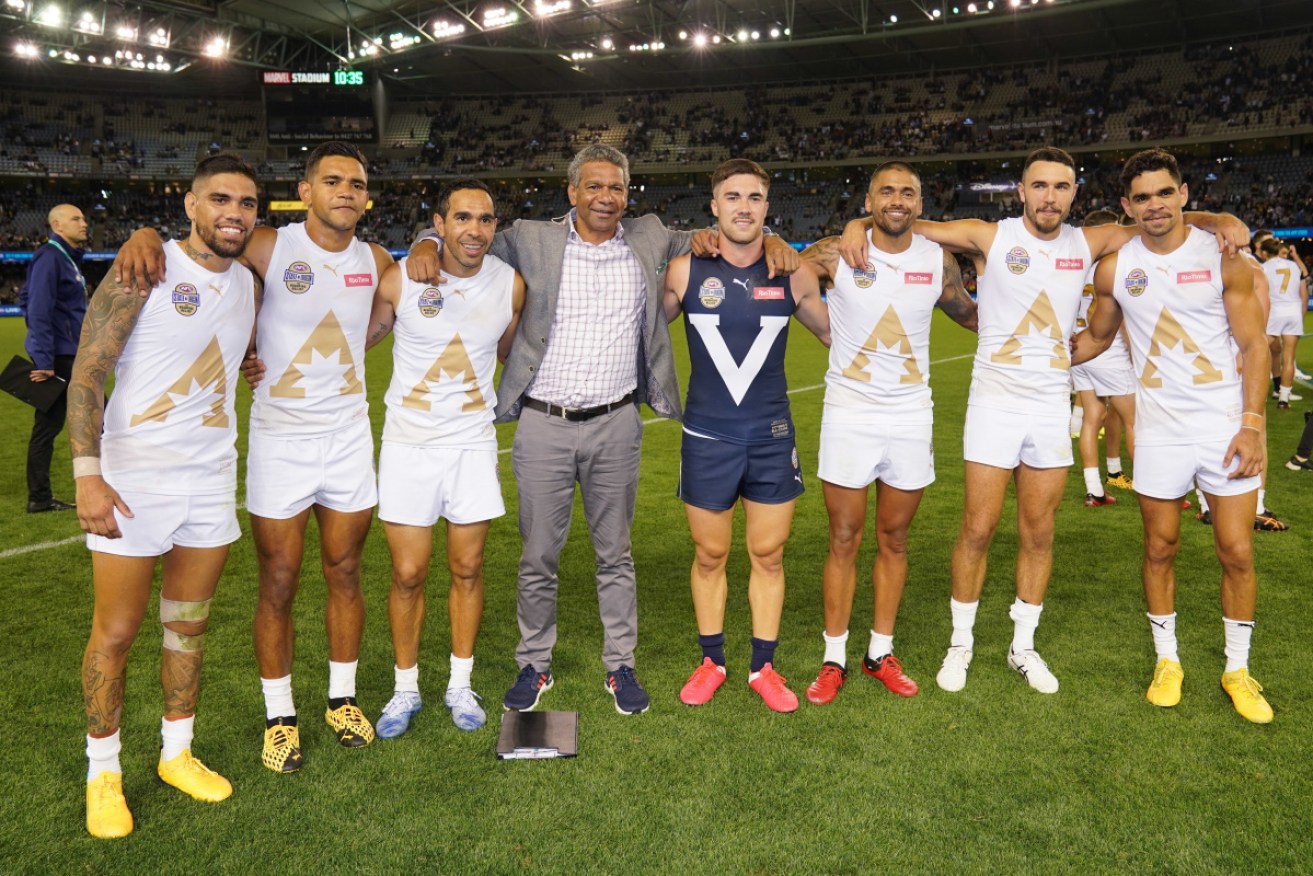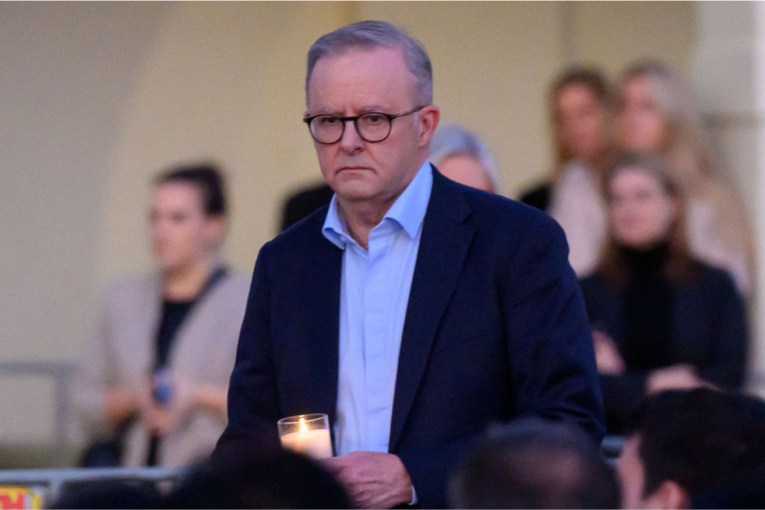Sport’s promise of diversity, equality and fair play is a work in progress


AFL indigenous players pose together with Gilbert McAdam during the Charity State of Origin for Bushfire Relief match between Victoria and All Stars at Marvel Stadium earlier this year. Photo: AAP
Of sport’s unique place in society, former US Supreme court justice Earl Warren famously once said: “I always turn to the sports pages first, which records people’s accomplishments. The front page has nothing but man’s failures”.
On the issue of racism, sport has often not lived up to this hope or its own ideals despite two decades of incremental steps aimed to elevate it beyond humanity’s greatest curse.
Even before the Black Lives Matter movement shone a renewed spotlight on the everyday injustices that beset minority and indigenous peoples, Australian sport knew there were still problems.
Many elite competitions sought to address the most obvious injustices through diversity and inclusion pathways and processes for dealing with in-competition racial vilification.

Nicky Winmar’s famous protest against racial vilification at the hands of Collingwood supporters during a match at Victoria Park in 1993. Photo: Wayne Ludby
But Australia’s biggest football code got a wake-up call about how little things had changed when it baulked at showing leadership on the booing of AFL indigenous champion Adam Goodes at a time when the Swans player was at his most vulnerable.
Just this season Carlton indigenous player Eddie Betts has copped more abuse, while Collingwood has been forced into an internal inquiry about claims of racist attitudes directed at former player Heritier Lumumba.
The global movement to combat racism has seen the reassessment of the language we use, the products we buy and the depictions of minority groups in entertainment.
That Channel Nine’s Footy Show, with many football identities smirking along, could have taken so long to disassociate itself from ratings-winner Sam Newman says a lot about the media game and even more about those advertising and watching.
This week’s legal back down and apology by Newman and his fellow podcasters Don Scott and Mike Sheahan on their reinterpretation of Nicky Winmar’s ‘black and proud’ gesture at Victoria Park in 1993 at least suggests the times of being able to laugh off such an outrage are fast fading.
Tweet from @JustinSmith3AW
On Tuesday, soccer also received a sobering assessment of its failures with the release of research commissioned by RunRepeat and supported by the Professional Footballers Association which showed systemic bias in football coverage.
White footballers were more often referred to as more intelligent, as being of higher quality and harder working than non-white players, while black players were more often referred to by their physical characteristics.
Head researcher Danny McLoughlin told The New Daily that clearly more work needs to be done to stamp out unconscious bias in sport.
“The commentary was chosen because there was an existing methodology but it could have just as easily been studio analysis, podcasts, or print media and I reckon we would find similar findings,” he said. “The study was intended to start a football wide conversation.”
It has certainly succeeded in that goal.
Former Socceroo turned media commentator Craig Foster believes unconscious bias “exists in all of us and is certainly highly prevalent in sport”.
“I note the study says that 94 per cent of commentators are white which, given the prevalence of black players in all of the top teams in Europe, is extraordinary,” Foster told The New Daily.
“Racial inequalities, in particular, are perpetuated by systemic barriers which include those who maintain the intellectual status quo. We all must challenge ourselves to ensure that our views don’t exclude, stereotype or marginalise those we are talking about.”
Foster says there is scant, if any, training for football commentators or analysts to understand the inherent biases they may carry.

Teamwork, commitment and bias? Liverpool players celebrate their EPL title. Photo: AAP
The SBS commentator says in world football there are often extreme cultures and differences between players, clubs, countries.
“I recall on day one of preparation for the 2002 FIFA World Cup, Japan and Korea, I spoke with South Korean and Russian radio journalists from SBS to ensure that player name pronunciations were accurate.
“That is the beginning, as an example. Mispronouncing an athlete’s name, who may be from a different country, ethnicity, race communicates something, it is not neutral.
At times innocent, an effort must be made to respect each athlete in order to communicate that everyone is equal.
“Equality and inclusion means being sensitive to language that expresses superiority of one over another, that perpetuates harmful characterisation of minorities or races and certainly stereotyping of nationalities is often an issue.”
Formula One, which on Sunday held its first Grand Prix since the aborted the Australian season-opener is also taking steps to improve its public opposition to racism.
With much of the F1 paddock comprising white males, black British superstar Lewis Hamilton has made a stand, attending Black Lives Matter protests in London and being joined by 13 fellow drivers to ‘take a knee’ before the Austrian Grand Prix.
Tweet from @LewisHamilton
Not all drivers took part, however, with rising Dutch superstar Max Verstappen joining Ferrari’s Charles LeClerc and four other drivers in standing behind the others while wearing ‘end racism t-shirts’.
Tweet from @Max33Verstappen
The sport itself had been forced to turn its back on former F1 supremo Bernie Ecclestone after he opined that “in lots of cases, black people are more racist than what white people are”.
It’s this sort of comment in the recent politically charged atmosphere that has lifted the lid on why true diversity and inclusion has been a hard nut to crack in elite competitions.
In football, Craig Foster believes its the management systems that often let down teams which are able to see people of diverse backgrounds work together for an on-field goal.
“The system itself, whether management, club and fan culture can and usually does display the same biases and prejudice that exists in broader society,” Foster explains.
“Some sporting clubs are progressive, socially aware, but racial inequities exist over long periods of time for a reason. They’re related to power structures and hierarchies … a lack of diversity at Board level as well as social, cultural and economic pressure on athletes means there is often a reluctance to act decisively when racism rears its head.
“We have seen this reluctance in recent years in Italy and parts of Western and Eastern Europe in particular, for example. Governing bodies must have stronger policies, prohibitions and penalties.
“If the sport is compliant, racist fans may feel empowered and the burden has fallen on individual players themselves.”
Ultimately, sport’s backpage feel-good factor as described by Justice Warren can be summed up by the mantra, nobody wins, unless everybody wins.








